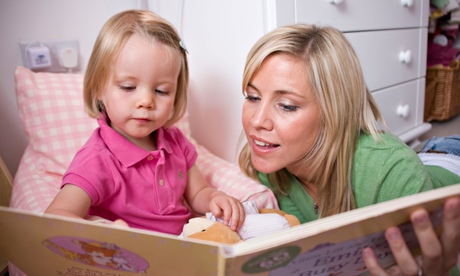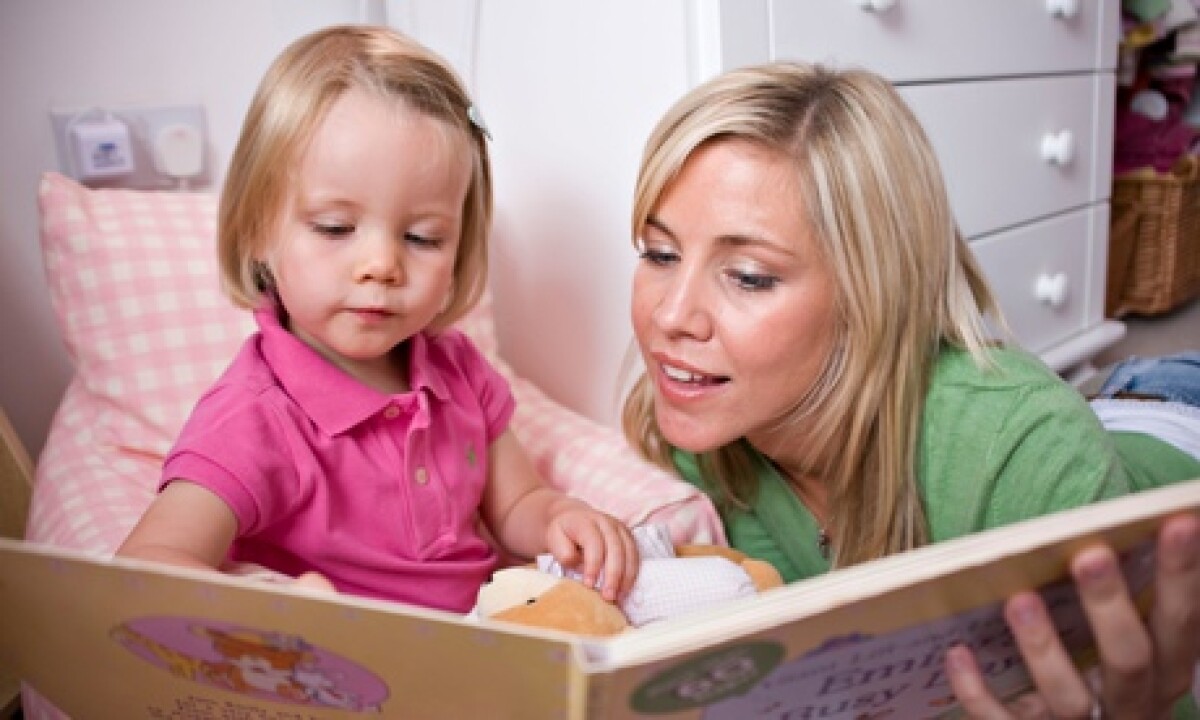Researchers from the University of Sheffield identify significant link between deprivation and not reading books.

Research shows 'significant' link between a family’s reading habits and a child’s future attitude to reading … a mother reads a bedtime story.
Photograph: Alamy
New research shows a stark and "worrying" cultural divide in the UK when it comes to reading, with half the country picking up a book at least once a week for pleasure, and 45% preferring television.
The England-wide survey of the reading habits of 1,500 adults by the University of Sheffield says that on average, the higher the socio-economic group that someone is in, the more often they read: 27% of DEs never read books themselves, compared with 13% of ABs, while 62% of ABs read daily or weekly, compared with 42% of DEs. Reading charity Booktrust, which commissioned the research, believes its findings should serve as a warning that "Britain's divided reading culture is a barrier to social mobility".
The study indicates "links between deprivation and not reading books", said Booktrust, with those who never read living in more deprived areas, with a higher proportion of children living in poverty, and those who read less "more likely to be male, under 30, and have lower levels of qualifications, happiness, and satisfaction within their lives".
One respondent, a male who fell into the survey's 30-44 years age bracket, told researchers: "The fact is, it's 2013 not 1813. We have electricity now so we can buy DVDs and watch television rather than read books. Books are for an older generation, younger people on the whole do not read books."
Overall, nearly a fifth of adults surveyed (18%) said they never read physical books at all, and 56% said they believe the internet and computers will replace books in the next 20 years. This figure rises to 64% among 18 to 30-year-olds, said Booktrust. Twenty-seven per cent of respondents said they preferred the internet, and social media, to reading books, with this proportion rising to 56% for 18 to 30-year-old respondents.
Although most of those who read regularly told the researchers that this improves their life, this was more pronounced for higher social-economic groups, said Booktrust, with 85% of ABs saying reading helps to make them feel good, compared to 69% of DEs.
The research also shows the "significant" link between a family's reading habits and a child's future attitude to reading, with 89% of respondents whose parents read to them as children reading regularly to their own children, compared to 72% of respondents whose parents didn't read to them. Booktrust is "concerned that this divided reading culture is leading to large numbers of children missing out on the benefits of books", and is running a conference on Tuesday at which figures including children's laureate Malorie Blackman, and the MPs Alan Johnson and Liam Fox, will attempt to kick start a national conversation about improving social mobility by encouraging reading earlier.
Blackman told the Guardian that a love of books "is one of the greatest gifts that can be passed down to our children", but that "sadly too many are missing out".
"The new research shows this has a negative impact on so many aspects of life – wellbeing, happiness and employment," said Blackman, adding that families "have a huge role to play in encouraging reading from an early age and supporting parents is crucial".
"We need to reduce poverty and improve social mobility – spreading the opportunity to read is one of the most powerful ways we can do this," she said.
Labour MP Alan Johnson also responded to the survey, saying: "This new research reminds us that we need to give everyone a hand up the reading ladder … By putting reading at the centre of early intervention and child poverty strategies, and in particular fostering a love of books, we can ensure all children have the best possible start. A positive one nation reading culture can be transformative."
Booktrust chief executive Viv Bird said the research indicates that frequent readers "are more likely to be satisfied with life, happier and more successful in their professional lives. But there is a worrying cultural divide linked to deprivation. There will never be a one-size-fits-all solution when it comes to social mobility, but reading plays an important role – more action is needed to support families. "
Source: http://www.theguardian.com/












